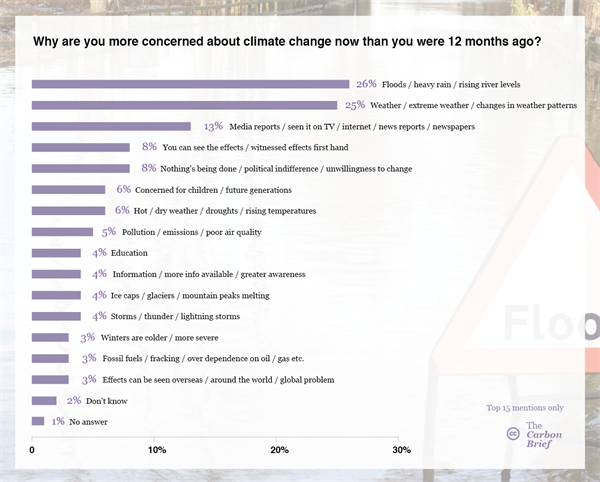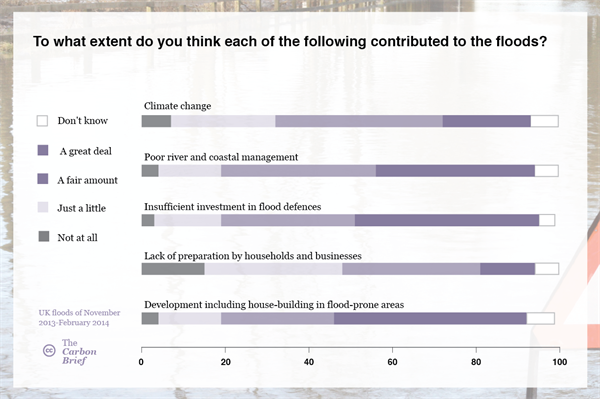
UK flooding pushes public acceptance of manmade climate change to five-year high
Robert McSweeney
01.29.15Robert McSweeney
29.01.2015 | 12:01amThere is growing public acceptance of the human contribution to climate change, according to a new study published today. The latest results from a national survey show public agreement that humans are causing climate change is at its highest level for 5 years.
The researchers also find that those affected by the UK winter floods in 2013-14 were significantly more likely to be concerned about climate change than those that weren’t affected.
Public acceptance
A year on from the major winter flooding in the UK, the new study led by Cardiff University sheds new light on public perception of climate change. Researchers interviewed 1,002 people across the country about their views on climate change and the floods.
The results of the survey show almost nine in 10 respondents said the world’s climate is changing (88 per cent), and more than eight in 10 said human activity was at least partly the cause (84 per cent). This represents the highest level of acceptance that the climate is changing since surveys began asking the question in 2005. More than a third (36 per cent) said that climate change is mainly or entirely caused by humans, which is the most agreement on the human impact on climate change since the question was first included in comparative surveys in 2010.
Responses from this and previous surveys to the question ‘As far as you know, do you personally think the world’s climate is changing?’. Source: Capstick et al. (2015).
Responses from this and previous surveys to the question ‘Thinking of the causes of climate change, which best described your opinion?’. Source: Capstick et al. (2015).
The results show a rise in public acceptance of climate change, Dr Stuart Capstick, a research associate from Cardiff University and lead author of the study, tells Carbon Brief:
“Public acceptance of the basic reality of climate change and public acceptance of the human component of climate change have both risen quite sharply over the last one to two years.”
The survey results don’t give a direct answer to why public acceptance has increased in the last year, but Capstick says that climate change has come to establish itself as a major national issue for people:
“This is something on the public’s radar now.”
Important issue
Respondents were asked what they saw as the three most important issues facing the UK today. The researchers didn’t give the respondents a list to choose from, so the respondents were free to pick any issue they thought of. In addition, the researchers posed this question first, so respondents weren’t prompted by any earlier questions about climate change.
Around one in nine people (11 per cent) put climate change as a top issue. This is comparable to education and housing (both 12 per cent), but lags behind immigration (35 per cent) and the economy (33 per cent).
Chart showing proportion of respondents referring to issues being in the top three facing the UK today (purple bars) and in the next 20 years (green bars). Data from Capstick et al. (2015), infographic by Rosamund Pearce, Carbon Brief
These results are surprising, says Capstick:
“The number of people referring spontaneously to climate change as one of the top national issues was much higher than we would have expected.”
Looking ahead, 15 per cent of respondents also rated climate change as a particularly important issue for the UK over the next 20 years. This puts it fifth, again behind immigration and the economy as the top issues. This suggests that the public view climate change as more of a long-term problem than one to worry about now, Capstick says.
Changing climate change concern
Around a quarter of respondents (26 per cent) said they have become more concerned about climate change over the past year. Just four per cent said they have become less concerned, and 69 per cent said their concern was about the same.
Of those whose concern had increased, over half said it was due to changing weather patterns (25 per cent), or flooding and heavy rain (26 per cent). This outweighed, for example, the influence of media reports (13 per cent), education (four per cent), or being aware of scientific evidence (less than one per cent).
This suggests that extreme weather events, such as flooding, are important in how the public perceives climate change risk, the researchers say.
Chart showing reasons most commonly given for a changing personal concern on climate change in the last year. Data from Capstick et al. (2015), infographic by Rosamund Pearce, Carbon Brief
Winter floods
The respondents were asked specific questions relating to last year’s winter floods. The 2013-14 winter was one of the most exceptional periods of rainfall in England and Wales since records began 248 years ago. The result was persistent flooding across much of southern England and Wales, and around the coast.
When asked about the recent spell of flooding, over half of respondents (61 per cent) said climate change contributed a ‘fair amount’ or a ‘great deal’. In comparison, around three-quarters of respondents pointed the finger at lack of investment in flood defences, poor river management and building houses in flood-prone areas.
A warmer atmosphere can hold more moisture, which is the fuel for heavy rainfall. Scientists expect that as the world warms, rain is likely to fall in heavier bursts, raising the risk of flooding.
72 per cent of respondents agreed that the floods showed the kind of events we can expect in future with climate change. This figure is much higher than a YouGov poll in early 2014, which found that 40 per cent of respondents thought the winter floods were probably a result of climate change. The difference may be down to how the question in the new study was phrased, says polling expert Leo Barasi:
“If you give people a statement and ask whether or not they agree, they are, on balance, more likely to agree than disagree.”
Chart showing the perception of factors affecting the 2013-14 winter floods and their impact. Data from Capstick et al. (2015), infographic by Rosamund Pearce, Carbon Brief
Flood exposure affects opinion
As well as the national survey, the researchers quizzed members of the public in five regions of the UK that directly experienced flooding during the 2013-14 winter. These included Dawlish, Gloucester-Tewkesbury, Sunbury-Windsor, Aberystwyth, and Hull.
The researchers surveyed 995 people, of whom 135 lived in properties that had been flooded. For these people, the survey results show greater concern about the threat of climate change. Seventy-five per cent of those flooded said that they are concerned about climate change, compared to 68 per cent in the wider national survey.
Respondents who had been flooded were also significantly more likely to say they have become more concerned about climate change over the last year (46 per cent compared to 26 per cent in the national survey). They were also more likely to say that climate change is one of the three most important issues facing the UK in the next 20 years (29 per cent, compared to 15 per cent).
The results suggest that being hit by an extreme weather event makes climate change more prominent in people’s mind, Capstick says. This growing acceptance and concern about climate change could translate into greater public support for international action, Capstick concludes:
“As we’re in the run up to the next big set of negotiations in Paris this year, it seems from the data in the study that there is quite a mandate for UK political action at the international level on climate change.”
However, Barasi warns against over-interpreting a single survey. For example, the jump in acceptance of climate change from 72 to 88 per cent over the last year is unusually high:
“There’s a rule of thumb in polling, called Twyman’s Law, that an interesting or unexpected finding is probably wrong. So we should see if this is replicated in other polls before being utterly convinced that there’s been such an increase.”
Main image: Hay bale in flooded field.
Updated to include quotes from Leo Barasi at 12:23 on 29/01/2015. Capstick, S.B. et al. (2015). Public perceptions of climate change in Britain following the winter 2013/2014 flooding. Understanding Risk ResearchGroup Working Paper 15-01,CardiffUniversity, Cardiff, UK.
-
UK flooding pushes public acceptance of manmade climate change to five-year high





